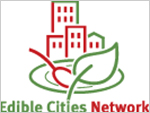|
| EU and international affairsProjectsSocially integrative city The “Neighbourhood centres” and “Libraries in the neighbourhood” programmes are implemented by the Senate Department for Labour, Integration and Social Affairs and the Senate Department for Culture and Europe. Edible Cities Network – EdiCitNet The city is becoming edible: residents are creating and maintaining green oases. Vegetable patches are created or fruit trees grow there. Communal gardens and other “edible” initiatives improve individual quality of life, are important social places and make a valuable contribution to the development of the neighbourhood. The integration of food production is a major step towards making cities more sustainable, more pleasant to live in and healthier. The funding of around €12 million from the European Horizon 2020 research programme is being used by over 30 partners from science, administration, practice and business to work together to further develop this instrument of sustainable urban development. 12 cities in Europe and worldwide are participating as practical partners in EdiCitNet, including the Senate Department for Urban Development, Building and Housing in Berlin. Metropolitan Industrial Spatial Strategies & Economic Sprawl The Senate Department for Urban Development, Building and Housing in Berlin, together with the cities of Vienna, Warsaw, Riga, Oslo, Turin and Stuttgart, is involved in the one-year research project. It is financed within the scope of the European Spatial Planning Observation Network ESPON with funds from the European for Regional Development Fund (ERDF) and ends in October 2020. ContactDr Marion Mienert Head of Unit Tel.: +49 30 90139 4160 Email: marion.mienert@senstadt.berlin.de Daniela Heldt International affairs, Events Tel.: +49 30 90139 4162 Email: daniela.heldt@senstadt.berlin.de Götz Müller EU affairs, Competitions Tel.: +49 30 90139 4163 Email: goetz.mueller@senstadt.berlin.de Links | |||||
 Leichte Sprache
Leichte Sprache